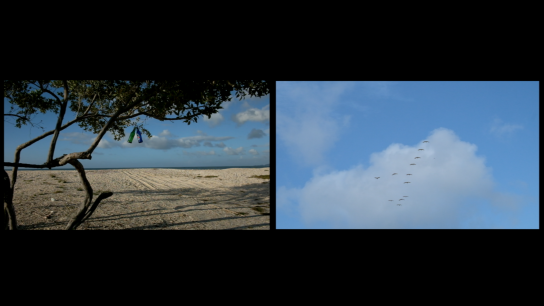Margarita
by
Inauditas: Tracing the Sound of Migrant Memories in Venezuelan Women Photographers is an exhibition on migrant photography and photography of migration, focusing specifically on Venezuelan migration from 2016 to 2022. Each artist featured in this exhibition challenges the notion of photography that reduces it to the “visual,” while disorganizing a traditional notion of the “audible” that takes away its “auratic” effects, thus reinforcing the experience of photography as one of listening.
Margarita includes both English and Spanish text translations.
Margarita (English)
Margarita is an invitation to contemplate the landscapes of an island in continuous movement and transformation, as would be an image in memory that is shaped each time it is recalled.
Within the long tradition of conceptions of landscape, relating it to memory requires understanding it as a set of interactions and symbolic dialogues built over the years for generations to create a universe of meanings about a territory.
When we talk about migration, we see ourselves before an experience that is related to this conception of landscape, a landscape that is not simply the expression of a time, but the “manifestation of all the varied times that, acting with the place and the matter, define spatialities, memories and identities.”1
The economic and political situation in Venezuela has disconnected millions of Venezuelans from their territory, pushing them to forced migrations and tireless searches for a quality of life in other countries. My family has been one of those thousands of families fragmented by the military “narco-dictatorship” of the last decade.
Margarita is a contemplative and silent journey through the memory-landscapes of my family. As farewell, a voice reflects on migration in different generations, on the body traveling through a territory at different times, feeling it and observing it as a form of creation. It seeks to be a journey through the conductive threads between landscape, memory and time of what an island means, for a family.
– Diana Rangel Lampe
Curatorial Commentary
From the present of observation, the voice of Diana Rangel Lampe and that of her father alternate in the thread of family memory. From another time of internal migrations, from the Isla de Margarita to other states of Venezuela, some motivated by the search for better living conditions, others by political repression during the Pérez Jiménez dictatorship in the first half of the 20th century, we are invited to contemplate the parallels between the past and the present of a Venezuela marked by a humanitarian crisis and mass exodus. Between the images and their voices, a brief crack opens where the affective cannot be fully captured by the narrative order, and where it (the affective) shines through in the tone, in the staggering, in the breathing, in the out-of-synchrony sound and in the small movements.
Margarita (Español)
Margarita es una invitación a la contemplación de los paisajes de una isla en continuo movimiento y transformación, como lo sería una imagen en la memoria que es moldeada cada vez que es rememorada.
Dentro de la larga tradición de la concepción del paisaje, relacionarlo con la memoria requiere entenderlo como un conjunto de interacciones y diálogos simbólicos construidos a lo largo de los años por generaciones para crear un universo de significados acerca de un territorio.
Cuando hablamos de migración, nos vemos ante una experiencia que se relaciona con esta concepción de paisaje, un paisaje que no es simplemente la expresión de un tiempo, sino la “manifestación de todos los variados tiempos que, actuando con el sitio y la materia, definen espacialidades, memorias e identidades.”2
La situación económica y política de Venezuela ha desvinculado a millones de venezolanos de su territorio, empujándolos a migraciones forzadas y búsquedas incansables de una calidad de vida estándar en otros países. Mi familia ha sido una de esas miles de familias fragmentadas a causa de la “narco-dictadura” militar de la última década.
Margarita es un recorrido contemplativo y silencioso a través de los paisajes-memoria de mi familia. A modo de despedida una voz va reflexionando acerca de la migración en distintas generaciones, del cuerpo recorriendo un territorio en distintos tiempos, sintiéndolo y observándolo como forma de creación. Busca ser un recorrido por los hilos conductores entre paisaje, memoria y tiempo de lo que significa una isla, para una familia.
– Diana Rangel Lampe
Comentario de las Curadoras
Desde el presente de la observación, la voz de Diana Rangel y la de su padre se alternan en la ilación de la memoria familiar. De otro tiempo de migraciones internas, de la Isla de Margarita a otros estados de Venezuela, unas motivadas por la búsqueda de mejores condiciones de vida, otras por la represión política durante la dictadura de Pérez Jiménez en la primera mitad del siglo XX, se deducen también los paralelos entre el pasado y el presente de una Venezuela marcada por una crisis humanitaria y el éxodo masivo. Entre las imágenes y sus voces se abre un breve resquicio donde lo afectivo no puede ser capturado del todo por el orden narrativo, y se trasluce en el tono, en los trastabilleos, en la respiración, en el sonido fuera de sincronía y en los pequeños movimientos.
This photo essay is part of the Inauditas: Tracing the Sound of Migrant Memories in Venezuelan Women Photographers series, funded by a UCHRI Engaging Humanities grant.
Notes
- Aurora Carapinha, “Los Tiempos del Paisaje”
- Aurora Carapinha, “Los Tiempos del Paisaje”


